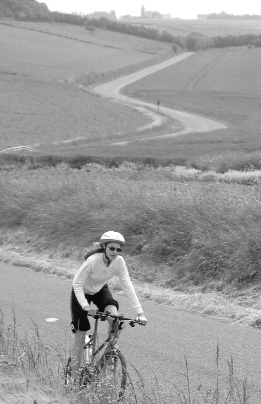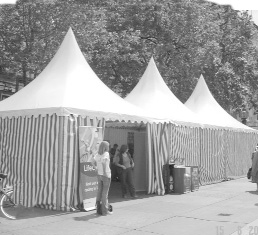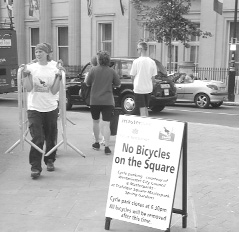FIRST PUBLISHED August 2014
Eurotunnel Cycle Services, London to Bright Charity Ride 2004
Press freebies are a bit thin on the ground these days, prompting the Mole to make grateful haste to Folkestone, following an invitation from Eurotunnel to ride through the Channel Tunnel and around something called the Pas de Calais, the foreign bit at the other end.
In the event, the riding through part turned out to mean putting ones bicycle aboard a trailer and travelling by minibus within a train, which sounds like rather more hardware than is strictly necessary, but there we are.
 Those wishing to take advantage of the Eurotunnel Cycle Service might wish to note that the closest railway station is actually Folkestone West, not Central, as carelessly printed in the press-pack, and that the cyclists’ rendezvous point is not at the terminal at all, but south of the M20 near the Folkestone branch of Tesco’s. One trusts this information will spare other cyclists the ordeal of joining the M20 motorway for the final approach to the terminal and being apprehended by security guards on the premises. Eurotunnel, it seems, has procedures to keep cyclists out of the tunnel.
Those wishing to take advantage of the Eurotunnel Cycle Service might wish to note that the closest railway station is actually Folkestone West, not Central, as carelessly printed in the press-pack, and that the cyclists’ rendezvous point is not at the terminal at all, but south of the M20 near the Folkestone branch of Tesco’s. One trusts this information will spare other cyclists the ordeal of joining the M20 motorway for the final approach to the terminal and being apprehended by security guards on the premises. Eurotunnel, it seems, has procedures to keep cyclists out of the tunnel.

Hangover- free: Fiona from Bournemouth making it all look very easy. PHOTO Jon Brooke
With composure fully restored, it is time to meet our driver, Norman, not at all the PR type, who kindly stows our bicycles on the trailer and makes us comfy in the minibus. This being a rather choice outing as freebies go, the ‘us’ includes Simon O’Hagan, a charming senior hack from the Independent on Sunday, who makes some excuse about crossing for the D-Day landings. With hardware and journos safely on board, we drive onto the train, vibrate for half an hour at Warp Factor One, and emerge in the Pas de Calais, which is not a bit like Folkestone.
At the Centre d’Affaires in Coquelles we are met by our tourist board minders – Laurence, who rather confusingly turns out to be a woman, and Nicholas, pronounced Nicola, who surprises us all by being a man. Soon we’re rolling through Sangatte, and into the uppie- downie bits, with Nicholas puffing and blowing on Laurence’s bicycle, while the cyclist drives the back-up van. Under cross-examination, it emerges that Nicholas has been banned for drink-driving and has thus been obliged to join us in some gentle exertions.
The coast road rolls past the cliffs of Cap Blanc Nez and Cap Griz Nez where Hitler first spotted Folkestone through his binoculars and famously changed his mind about the invasion. All too soon we’re pedalling through Wimereux, distinctive for its compulsory blue and white beach huts, to our seafront guest house, the Villa Tremail, where the maitre d’ has kindly opened a packet of PG Tips, producing some very weak tea in our honour.
…one of those events that sounds good, but leaves one wondering how it all went so horribly wrong…
The evening visit to a seafood restaurant proves noticeably short of high jinks, our small group remaining stubbornly sober, despite an unlimited bar tab. Independent Simon mumbles the old D-Day excuse, and Fiona from the Bournemouth Echo spends the whole evening toying with a single glass of wine.The menu includes steak, cod, and poisson de la jour, which turns out to be something odd but very tasty beginning with ‘r’. Retire to bed, tiresomely sober.
The next morning, we awaken to a sumptuous breakfast and another round of weak tea, before remounting our steeds for the ride back to Calais by the lightly trafficked inland route. Pausing only to stock up with duty-free in a handy hypermarket, which Norman cheerfully stows on the minibus, it’s all aboard once again, back on the train, another thirty minutes of underfloor massage, and we emerge in miserable old Britain.
Norman asks us to point out that the minibus runs from Folkestone at 08.00 and 15.30 daily, returning at 12.30 and 17.30 from Coquelles. In other words, a day trip is quite practicable, and at £16 for rider, bicycle (and child if on a child seat), quite good value. Strangely, a single ticket costs £31, Eurotunnel adding darkly that day- trippers failing to return will be liable to a £15 penalty. One assumes Norman counts them all out and counts them all back. Do cyclists from the Pas de Calais ever make the return trip to Folkestone? Somehow one suspects not.
Things aren’t all bad in Grande-Bretagne. The Mole was delighted to see Uncle Ken returned as mayor of London early in June, albeit with a less Congestion Charge-friendly assembly. This wonderful news was either deliberately or accidentally marked by a shindig in Trafalgar Square entitled ‘Lifecycle, Bikefest in the Square’ – one of those events that sounds good, but leaves one wondering how it all went so horribly wrong.
As one understood it, this was to be a demonstration of the latest advances in capital cycling, and London’s big cycle dealers, plus manufacturers Brompton and Giant booked space with enthusiasm.

Bikefest: The modest tent
Quite why the normally astute Transport for London had asked management company, GDF Diversivents to stage a BMX/skateboard-fest is unclear, but wires obviously became crossed somewhere along the line. On arriving at Trafalgar Square – which certainly looked like a suitable cycling venue on a Sunday afternoon – the Mole was greeted with a rather fierce sign to the effect that bicycles were banned. Limited cycle parking, it seemed, was available elsewhere (bicycles must be removed by 6.30pm on pain of death, etc), or you could just bugger off, depending how enthusiastic you were about BMX and skateboarding. Anyone innocently wheeling their bike across the Square was swiftly evicted by a posse of security guards, the ‘Strictly No Bikes’ rule being vigorously enforced. Not a good start. The second problem was the tent. You can book larger tents for suburban weddings, yet this one was hired to accommodate Sustrans, the London Bicycle Tour Company, Leukemia Research, Giant, The Cycle Show, Evans Cycles, Brompton, Cycle Training UK, Cycle Works, the London Cycling Campaign, the All Abilities Access Group, Bikeweek and the National Cycling Strategy.

‘No Bicycles’
To make matters worse, the very small tent had just one very small entrance, so those members of the public who managed to fight their way in through the mêlée of stallholders, were obliged to turn and fight their way back out through the same orifice. Obviously, anything as cumbersome as a bicycle would have been a serious hazard in such a small space, so display bicycles were banned too.
Outside, there was a bicycle try-out zone, manned by London’s very able Bikefix, but it was hidden away behind the concert hall plasma screen showing nothing in particular, and the BMX, skateboard and roller-blade demo zone. With Bikefix (bless ‘em) intent on demonstrating recumbents, the sensible commuter bikes were rather swamped.

Bollywood on Bikes was the best bit
One suspects that even the French might have made a better job of it, but then transport faux pas are something of a British speciality these days.Take the London to Brighton charity cycle ride. Organised by the British Heart Foundation (‘in tandem with Shredded Wheat’, apparently), this event has become the biggest in Europe, attracting 27,000 official riders each June, plus numerous hangers on, including a few, no doubt, who just happened to be visiting the Tooting branch of Sainsburys and found themselves swept along in the throng.
Anywhere else in Europe, special trains would be provided to get 27,000 cyclists home, but not here. In previous years, the British art of fumbling through came into play – extra guards’ vans were found and dusted down, seats were removed from octogenarian rolling stock, and thousands of cyclists ferried home in time for tea.
In 2002, the British Heart Foundation received a note from the then train operator South Central, advising that new rolling stock would be in use on the Brighton line in 2004, so there would be no special arrangements.To enforce the “…the British Heart Foundation decided to send everyone home by road…” ban, an exclusion zone would be created around Brighton railway station, effectively banning all cyclists on the day, whether taking part in the ride or not.
Although suitable rolling stock was available for hire, the British Heart Foundation decided to send everyone home by road, marshalling a fleet of trucks and buses on to the A23, which promptly ground to a halt.
Meanwhile, Brighton railway station was under siege, protected only by a thin blue line of security gorillas. At this stage, a wily group of bicyclists rode to the northern suburbs and boarded a London train at Preston Park station. Having no bikes, the security bods got caught up in the chaos on the A23 and failed to beat them to it.The bicyclists boarded the train, the guard refused to restart, and the line was effectively shut for an hour and a half, until the police arrived and marched the offenders off to Brighton nick.

The ripple effect of this infamous dénouement left confusion and congestion for some time. Innocent cyclists visiting or shopping in Brighton were left tearfully stranded, trains were cancelled and roads blocked. Some participants had driven two cars from London to Brighton in the small hours, left one, returned to London with the other, cycled back to Brighton, and driven back… a total of 230 car-miles. One wonders whether the stress and pollution of the day didn’t kill as many participants as were saved by the healthy exercise.
 Next year, an altogether better option might be to join one of the World Naked Bike Rides, which tend to be urban events, and thus more easily accessible. Strangely, WNBR has received zero coverage in the cycling media, something A to B hopes to correct, with contributions from Spain (mainly bottoms), The Netherlands (rather formal, and exclusively male), and the USA (exuberantly uninhibited, as one might expect).
Next year, an altogether better option might be to join one of the World Naked Bike Rides, which tend to be urban events, and thus more easily accessible. Strangely, WNBR has received zero coverage in the cycling media, something A to B hopes to correct, with contributions from Spain (mainly bottoms), The Netherlands (rather formal, and exclusively male), and the USA (exuberantly uninhibited, as one might expect).
Well, it sounds more entertaining than National Bike Week, and quite effective as protests go. The aim, according to a breathless Press Release from World Naked HQ, was to, ‘face automobile traffic with our naked bodies as the best way of defending our dignity and exposing the unique dangers faced by cyclists and pedestrians as well as the negative consequences we all face due to dependence on oil, and other forms of non-renewable energy.’
 Er, yes. In 2005, they’re hoping to organise 1,000 rides. Perhaps they should hijack the London to Brighton? A bit more entertaining for railway staff, anyway.
Er, yes. In 2005, they’re hoping to organise 1,000 rides. Perhaps they should hijack the London to Brighton? A bit more entertaining for railway staff, anyway.
Folding bikes, of course, were unaffected by the Brighton disaster, although several ever-so-slightly smug folding bike owners found themselves caught up in the rail chaos on the way home, including Brompton marketing manager Edward Donald.
It seems that Brompton has been asked to produce the national ‘Bikes on Trains’ poster, to be displayed at stations and railway ticket agencies throughout Britain. Here was a great opportunity to push the bike/rail message and encourage the use of folding bikes.
 But nothing is simple these days. National rail posters have to be cleared by the Strategic Rail Authority, Association of Train Operating Companies and each of the 25 railway companies, reducing even the most inspirational design to a committee-inspired shell, and the artist to a quivering wreck. Sure enough, the first draft was deemed ‘insufficiently off-peak’, the second contained ‘too many bicycles’, as did the third.The fourth had ‘no visible safety fencing’, the train ‘didn’t look like a real train’, the station – you guessed it – wasn’t a real station and there were too few pedestrians. Finally, and most ludicrously, ATOC felt the poster was putting too great an emphasis on ‘touring in the countryside’ – the raison d’être, surely? The great names of British railway poster art must be turning in their graves.
But nothing is simple these days. National rail posters have to be cleared by the Strategic Rail Authority, Association of Train Operating Companies and each of the 25 railway companies, reducing even the most inspirational design to a committee-inspired shell, and the artist to a quivering wreck. Sure enough, the first draft was deemed ‘insufficiently off-peak’, the second contained ‘too many bicycles’, as did the third.The fourth had ‘no visible safety fencing’, the train ‘didn’t look like a real train’, the station – you guessed it – wasn’t a real station and there were too few pedestrians. Finally, and most ludicrously, ATOC felt the poster was putting too great an emphasis on ‘touring in the countryside’ – the raison d’être, surely? The great names of British railway poster art must be turning in their graves.
Fortunately, a few weeks later, ‘New’ Labour finally lost patience with our costly, inefficient, corrupt and generally useless privatised railway and abolished the less-than-Strategic Rail Authority.
Just days before, the Mole had received a desperate communication from Cambridge, where campaigners and residents have been fighting a long battle to have their railway service reinstated, against the wishes of Cambridgeshire County Council, which is pressing for the line to become a guided busway (see A to B 41). Things looked good for the railway campaign when the Council grudgingly revealed that it had received 4,000 letters opposing the busway, two that were ‘uncommitted’, and a miserly four in favour. Unfortunately, in one of its last, and pottiest policy statements, the Strategic Rail Authority unhelpfully chipped in with the announcement that it was in favour of, er, turning the strategic rail corridor into a busway. With friends like Richard Bowker, what need has the railway for enemies? Which brings us to the less than gratifying news that railway strategy will now be handled by the Department for (Road) Transport. Plus ça change…
Eurotunnel Cycle Service: Bookings are compulsory – tel 01303 288790 or 288933 Monday to Friday 09.00 to 17.30 email uktkt.desk@eurotunnel.com web www.eurotunnel.com/cycle . Pas de Calais Tourist Board: tel +33 3211 03460 mail accueil@pas-de- calais.com web www.pas-de-calais.com . Villa Tremail: tel +33 3213 03358 mail villatremail@free.fr
![]()